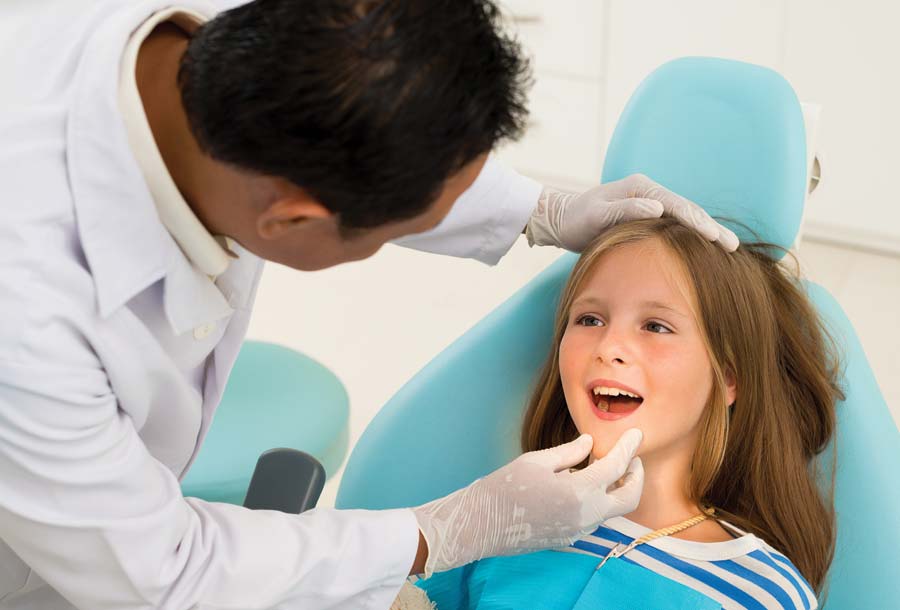Why See A Pediatric Dentist?
Understanding what these specialists can do for you and your child
 |
Both the American Dental Association (ADA) and the American Academy of Pediatrics recommend that all kids have a dental visit by age one. Both family dentists and pediatric dentists treat young patients; neither is necessarily "better" or "worse" for most kids. What's the difference?
In many ways, family dentists and pediatric dentists can be compared to their counterparts in medicine: family practitioners and pediatricians. The former are generalists who see a variety of patients in all stages of life; the latter limit their practice to children and teens. Both types of dentists offer many of the same services — for example, exams and professional cleanings, preventive treatments like topical fluoride and dental sealants, and restorative treatments such as fillings. So where does the similarity end?
One difference is that pediatric dentistry is one of the nine specialty areas recognized by the ADA. To qualify in this specialty, a candidate must successfully complete two or three years of additional training after the standard four years of dental school, and must be licensed by the state in which they practice. Family dentists have also completed dental school, and are licensed by their state. They are committed to maintaining the oral health of people of all ages; however, they need not be certified in treating children specifically.
Aside from their additional training, pediatric dentists offer a practice that is especially geared toward making children feel safe and comfortable. This may include a waiting room filled with toys and child-size chairs, and a staff that makes an extra effort to ensure that each young patient feels comfortable. The atmosphere in this office lets you know that children are its focus — and while it may seem overly "kid-friendly" to some adults, this environment can help ease a toddler's path to the dental chair.
The "fear factor" is one reason why even some older children might benefit from seeing a pediatric dentist. A gentle manner and soothing words can go a long way toward easing a child's dental anxiety — but some kids need lots more attention and plenty of extra time. If your child is especially anxious, a pediatric dentist can help them conquer their fears. He or she may be prepared to spend a lot of time simply getting acquainted and showing your child around the office, before even asking them to open wide. (A family dentist can certainly do that too — it simply depends on the individual.)
Children who have special needs, such as autism spectrum disorders, ADHD, and behavioral or developmental disabilities, may also benefit from seeing a pediatric dentist. The soothing environment of the office, combined with the experience and training of the dentist and staff, can help ensure as stress-free an experience as possible.
Finally, children with particular dental issues might be well advised to seek out a pediatric dentist. For example, the condition called early childhood caries (ECC), an extremely aggressive form of tooth decay, can start during infancy or toddlerhood. If not treated promptly — and followed up with an effective program of prevention — it can lead to a young mouth full of cavities, and an increased likelihood of future dental problems. A dentist who deals exclusively with children's teeth will be familiar with this issue — and other potential oral health problems kids may experience.
Of course, there's nothing that says a family dentist won't provide the same expert care, offer an equally welcoming environment, and spend the extra time needed to make the smallest patient feel at ease. What's more, mom, dad and the kids can all see the same family dentist…forever — unlike a pediatric dentist, where you leave when you "age out." So if you're happy with your dentist — and if he or she regularly sees children — then, unless there are particular issues, the choice may come down to how comfortable you (and your kids) feel with that person.
Feel free to ask how your dentist would feel about having a new, very young patient, and pay attention to the atmosphere in the office. If you're comfortable there, chances are you'll pass some of that reassurance to your child. But if you don't have a regular dentist, or aren't sure if it's a good fit, ask your friends, family and other health care providers for recommendations. The earlier you start building a relationship of trust between your child and his or her dentist, the better it will be for their lifelong oral health.




